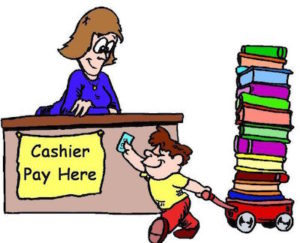The Evolution of the Ebook
I have something of a love-hate relationship with ebooks. And while I do think they are the future, I’m not sure I like that. At the very least, I feel a bit of remorse at the passing of paper books.
After all, the present form (the codex) of the paper book has been with us for approximately 1900 years. The codex replaced the scroll by the fourth century AD and was in use as early as the first century AD.
Now, I don’t think the paper book will disappear as did the scroll. I think paper books will survive. Although, I believe they will become rarer and rarer. Eventually, as bookstores disappear, and the older generations that grew up with paper books disappear, the ebook will become the standard form of the book.
We have moved from clay tablets to scrolls, to codices, to tablets once again. And the e-ink tablet is here to stay.
Although the majority of my reading is done on my laptop and iPad, I still love the feel and touch and smell of a book made from paper. I grew up with paper books. So I suppose my love for them is at least somewhat driven by nostalgia.
The Ebook — We Hates It!
What is it that I don’t like about ebooks? Here are some random thoughts, in no particular order:
-
-
- I don’t own my ebooks. I simply have a license to use them. And that really bugs me. Because it’s always possible that at some point I just might have a book I love disappear.
-
-
-
- I can’t resell my ebooks because I don’t own them. Which means if I “buy” a dud, I’m stuck with it. I’ve lost the money and have no chance to re-coup even a portion. At one point, Amazon was working on a re-sale agreement. But used ebooks are stuck in legal limbo. For now, the publisher owns the book and just lets you have the use of it. Too bad for you.
-
-
-
- There is no tactile pleasure associated with ebooks. They are cold and sterile.
-
-
-
- They are far more fragile than paper books. Because they are digital data, they’re open to corruption. They can also become unreadable when technology changes. Just like all the ancient writings that were lost that didn’t get copied from scrolls to codices.
-
-
-
- If my ereader dies, I can’t read or even access my books. Until I get my ereader fixed or get a new one.
-
The Ebook — We Loves It!
What do I love about ebooks? Here are a few random thoughts:
-
-
- They are so easy to store! I have hundreds of books on my iPad. If they were paper books I’d need another room in my house to shelve them, or even just to keep them in boxes.
-
-
-
- I never break a spine or have pages fall out of an ebook.
-
-
-
- I can adjust the text size. As I get older that is a very important feature. I can also adjust the font to find one that’s easier for me to read.
-
-
-
- It’s easy to search for a word or line in an ebook. Highlighting, or removing highlighting is easy. And you can’t remove highlighting in a paper book. Writing notes in the books is also easy, and I can even write lengthy notes that won’t obscure the text.
-
-
-
- I tend to read a book faster, because I find it easier to scan the boring parts.
-
-
-
- It’s also easier for me to carry my iPad than it is a book — especially a big book. And my phone is even easier to carry than a mass market paperback (which publishers are replacing with ebooks).
-
The Bottom Line
The proof is in the pudding (or, for the purists, the proof of the pudding is in the eating), as they say.
While I don’t know how many hundreds of books (probably thousands all told) I have in paper — I read more ebooks than paper books. It’s just easier for me to hold my iPad than it is a physical book. And it’s often easier for me to see the text on my iPad than it is the text in a physical book.
I used to be able to read tiny print. Not anymore.
Ebooks will probably enable me to read at a much older age then if all I had were paper books. And since reading is my favorite form of entertainment, I love ebooks. I do hate them as well. But maybe, just maybe, I love them more than I hate them. Then, again, maybe it depends on what day you ask me.
Comments are always welcome! An until next time, happy reading!
Share This!
